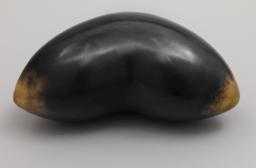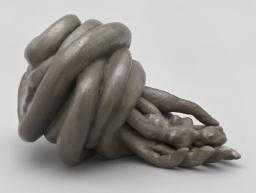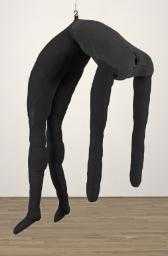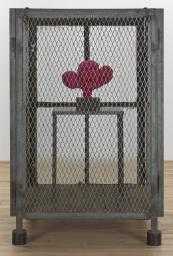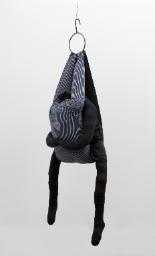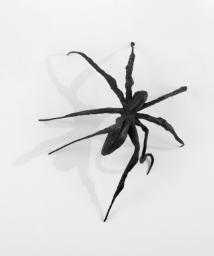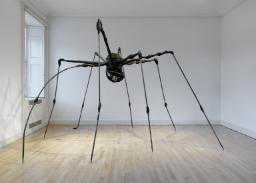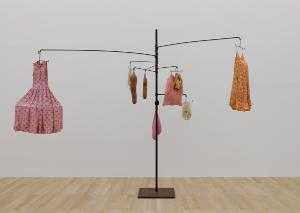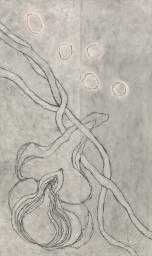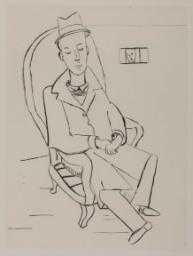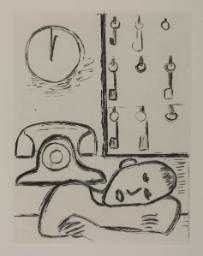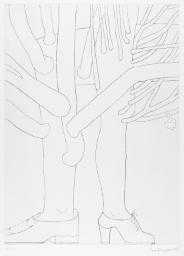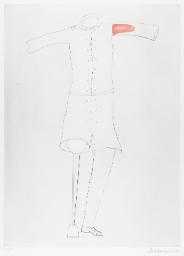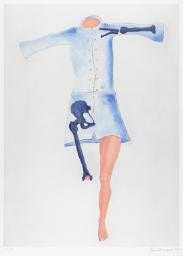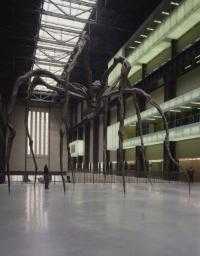
Not on display
- Artist
- Louise Bourgeois 1911–2010
- Medium
- Rubber, fibreglass and wood
- Dimensions
- Object: 482 × 3408 × 482 mm
- Collection
- Tate
- Acquisition
- Presented by the artist (Building the Tate Collection) 2005
- Reference
- T11916
Summary
Mamelles is a large-scale wall relief across which a series of female breasts are moulded, and is the first version in an edition of six. In its monumental size and structural form, Mamelles may be based on the idea of a classical frieze, running horizontally across a wall. However, this convention is subverted in the choice of subject and the work’s lack of a straightforward narrative.
Made of synthetic rubber, it has a tactile quality common to Bourgeois’s sculptural work since the 1960s, when she began working with a diverse range of material such as bronze, plastic, plaster and latex. Working with the malleability and physical properties of such media has enabled Bourgeois to create works which reference human anatomy in a direct and sensual manner. Unlike the unspecified bulges of Avenza (Tate T07781), Mamelles is explicit in form, with sixteen striking pink breasts undulating along its length, protruding into the space of the viewer. It exemplifies Bourgeois’s manipulation of individual components of the human body, dislocated from their original function to create an image loaded with symbolic potential.
As a wife and mother, Bourgeois has been preoccupied with themes of motherhood and female sexuality since the 1940s. The breasts appear to be at once a symbol of woman’s nurturing role, while also exposing the female body as a sexualised object, stripped bare and vulnerable. Bourgeois herself has said that the work ‘portrays a man who lives off the women he courts, making his way from one to the next. Feeding from them but returning nothing, he loves only in a consumptive and selfish manner.’ (Kotik 1993, n.p.). The artist has gone further to locate this idea more specifically within the character of Don Juan, noting that ‘Mamelles points out that Don Juan’s need to sleep with many women meant an inability to love.’ (Bernadac 1996, p.132) In this way, the artist appears to be both in league with, and critical of, this notion of all-consuming masculine desire. The strange conflation of a masculine viewpoint within a work which, in visual terms, appears highly femininised is typical of Bourgeois’s complex and highly personal practice. This reached a climax in the important The Destruction of the Father 1974 (Robert Miller Gallery, New York), an environment of latex breast-like forms related to Tate’s Avenza of 1968-9.
Further reading:
Charlotta Kotik, ‘Louise Bourgeois: An Introduction’, Louise Bourgeois: Recent Work, exhibition catalogue, New York 1993, n.p.
Marie-Laure Bernadac, Louise Bourgeois, Paris and New York 1996.
Lucy Askew
August 2005
Does this text contain inaccurate information or language that you feel we should improve or change? We would like to hear from you.
Display caption
Mamelles is a large-scale wall relief in which a series of female breasts have been moulded within a horizontal structure reminiscent of a classical frieze. The breasts can be seen as a symbol of woman’s nurturing role, while also exposing the female body as a sexualised object, stripped bare and vulnerable. Bourgeois has linked this work to the mythical seducer Don Juan, and said that it ‘portrays a man who lives off the woman he courts, making his way from one to the next. Feeding from them but returning nothing, he loves only in a consumptive and selfish manner.’
Gallery label, July 2008
Does this text contain inaccurate information or language that you feel we should improve or change? We would like to hear from you.
Technique and condition
The following entry is based on examination of the work and documentation in the conservation record held in Sculpture Conservation.
A fibre glass shell supported on a wood frame covered in pink rubber. On the top reverse of the sculpture are the artist’s initials, edition number and date: LB 1/6 MAF 2001
The sculpture is wall mounted by a wood baton which slides into a second baton on the back of the work allowing it to lay flush against the wall.
The sculpture is in good condition. The pink rubber was identified by Tate Conservation Science as synthetic rubber containing silicon. This is a stable rubber type which will not change colour dramatically or disintegrate at a fast rate.
Jodie Glen-Martin
October 2005
Explore
- architecture(30,960)
- emotions and human qualities(5,345)
-
- desire(149)
- vulnerability(311)
- government and politics(3,355)
-
- feminism(116)
- eroticism(409)
- gender(1,689)
You might like
-
Louise Bourgeois Tits
1967 -
Louise Bourgeois Nature Study
1986 -
Louise Bourgeois Single II
1996 -
Louise Bourgeois Cell XIV (Portrait)
2000 -
Louise Bourgeois Couple I
1996 -
Louise Bourgeois Spider I
1995 -
Louise Bourgeois Spider
1994 -
Louise Bourgeois Untitled
1996 -
Louise Bourgeois Love and Kisses
2007 -
Louise Bourgeois Sleeping Man
1994 -
Louise Bourgeois Man, Keys, Phone, Clock
1994 -
Louise Bourgeois Tree with Shoes
1998 -
Louise Bourgeois Amputee with Peg Leg
1998 -
Louise Bourgeois Blue Dress
1998 -
Louise Bourgeois Maman
1999

